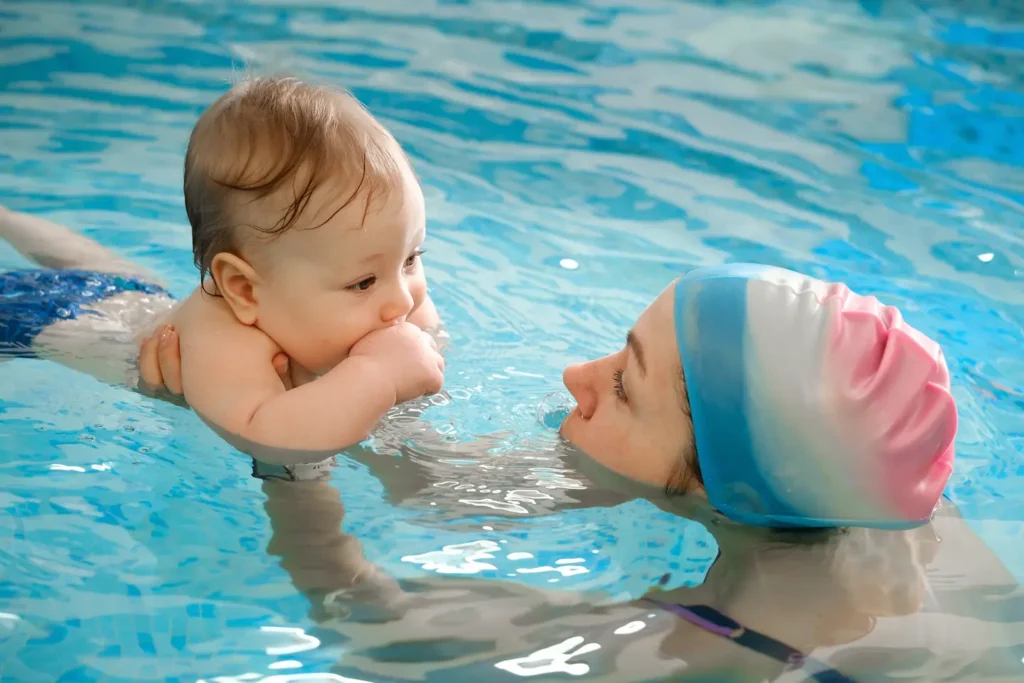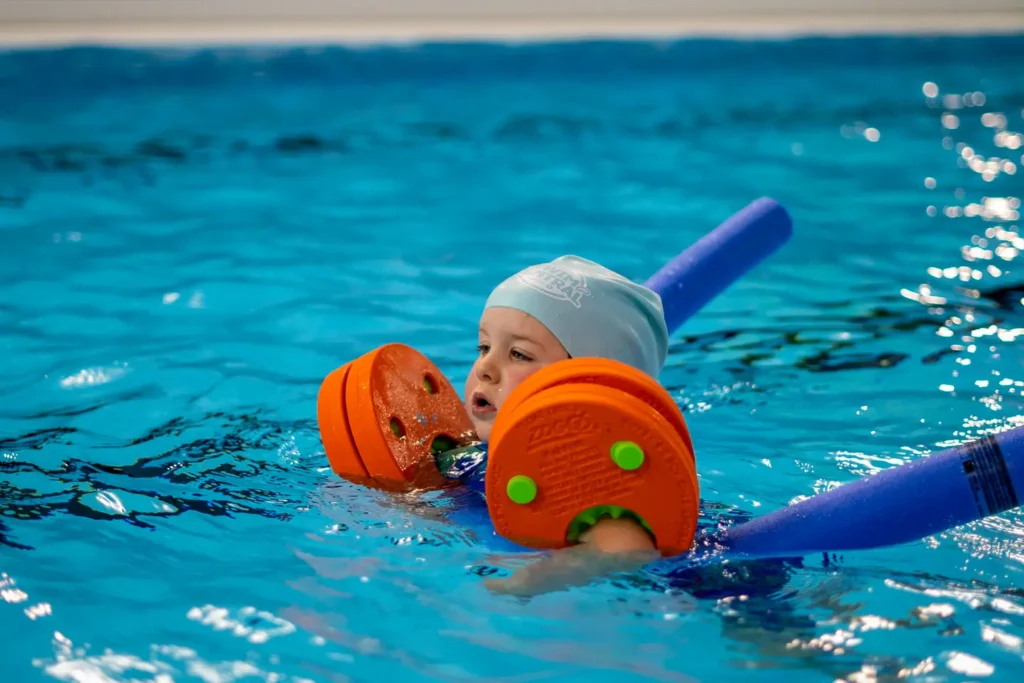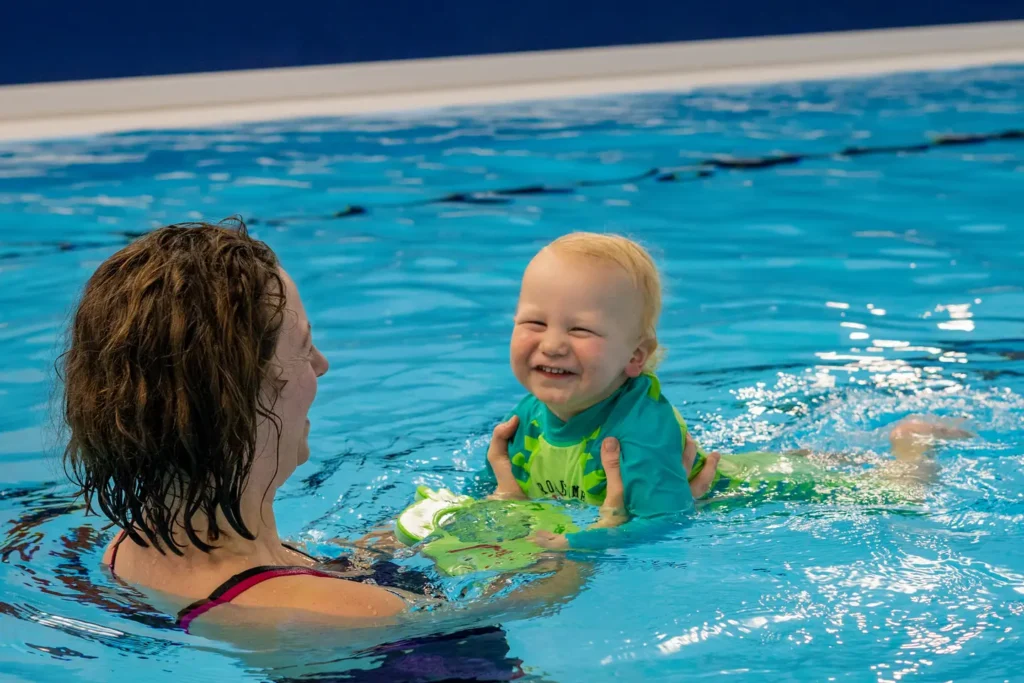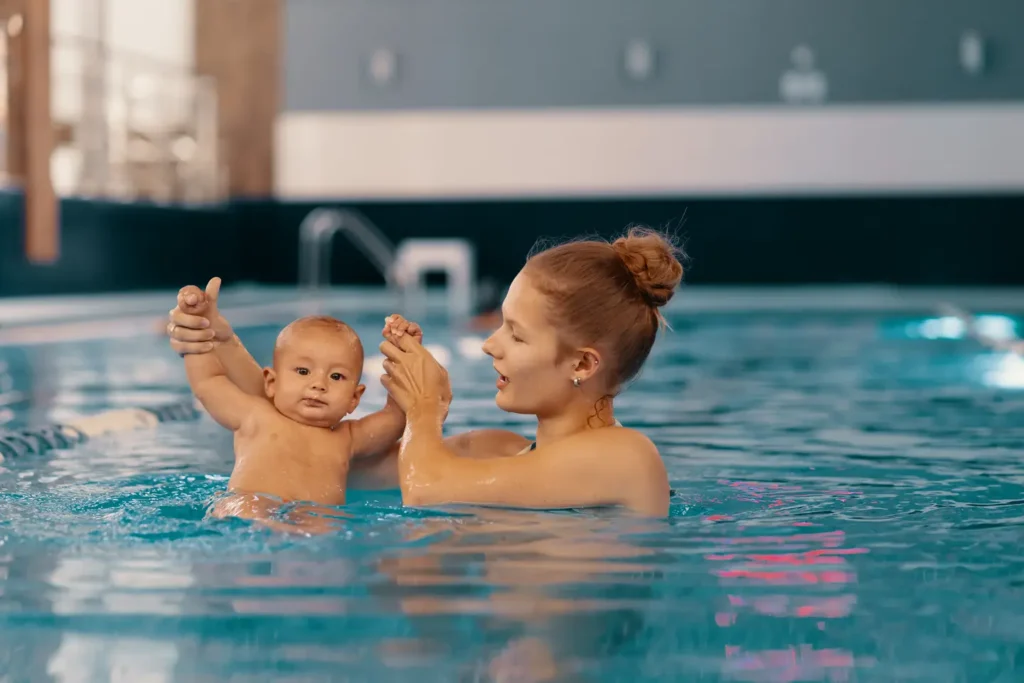A baby spends the first months of their existence happily floating around in fluid in their mother’s tummy. Therefore, in theory, a baby should be more than comfortable in the water as soon as they are born, right? Not quite.
Swimming in their lovely internal fluid is very different to swimming outside of this environment! There are some important factors to consider when deciding to take that first step into a swimming pool with your baby.
Starting Age
Six weeks old is considered to be the youngest age to start baby swimming. By this point, their hearing is fully developed, their neck strength is building, they’re moving their arms and legs and they’re identifying facial expressions. They also fully recognise their grown-ups, which is very important when building trust and bonding in the water. And it also lets the grown-ups have enough time to adjust to life with a little person; very important, especially if this is your first baby!

However, by six weeks old, they may not have had their first round of vaccinations. Some people prefer to wait until after they’ve had them, which can be at around eight weeks old (two months). Leaving it a few more weeks means baby’s immune system and physical development will have more time to develop too.
Currently, the NHS says that a baby can swim in a heating indoor swimming pool before their first round of vaccinations, although this is still a debated topic. Vaccinations are given at a roundabout age time, so there is flexibility in the decision about swimming for the first time.
The youngest baby to go swimming is recorded as being 31 hours old! But that little one’s father was a swimming instructor, so he may have been able to control many factors when going for a first swim!
However, it is not just age to consider. Things like weight, feeding, sleep, allergies, and other health conditions (for example, delay in development due to baby being premature) may have to be considered before taking that first dip.
Physiological Development
Skin
A baby’s skin is three to five times thinner than an adult’s skin and is very permeable. This is because there are fewer elastic fibres and the epidermis is made up of smaller cells in a baby’s skin. It takes at least three months for a baby’s skin to gain structure. Also, the surface area to body weight is far greater in a baby than in an adult.
Both of these things mean that a baby’s skin is more permeable, and the absorption of fluids occurs at a higher concentration level. Something important to consider when you’re submersing your baby in treated water, especially if they’ve had a skin reaction as a newborn like rashes, swelling and itching. These kinds of reactions can be linked to a baby’s immature immune system.
Umbilical Cord
One physiological aspect links back to age. A baby still has the healing of their umbilical cord to take place after birth. It can take up to three weeks for it to dry and drop off. Fifty percent of babies are prone to infection in this area as new tissue is forming and there may be some inflammation and granulation. This means the cord stump can be very permeable to fluids, which is a good reason to at least wait until your baby is six weeks old.
Body Temperature
Babies cannot regulate their body temperature the same as adults. In fact, it can take up until they are four or five years of age to really get to grips with the heat and cold! Babies don’t shiver, they turn blue when they are too cold. So, when you swim for the first time, you have to keep a watchful eye on your little one. A very young baby may only be able to cope with 15 minutes in a heated indoor swimming pool for the first time. But that’s plenty of time to see them respond to a brand-new environment!

Immune System
Dr Amy Myers, a renowned doctor in functional medicine, advocates delaying a baby’s first bath for up to 48 hours after birth instead of 24 hours that has been the norm for many years. This is because research has shown that the thick, white, cheese-like substance called vernix caseosa, which covers and protects the baby in the womb, is absorbed into their skin and is very beneficial for the baby’s immune system. Leaving it to absorb is far better than washing it off.
Her findings support the concept that giving a baby’s immune system the best chance to naturally develop strength is a great option before going for a swim for the first time. A baby’s immune system doesn’t mature until they are two to three months old, supporting the theory of swimming no earlier than six weeks with your newborn.
Psychological Aspects
A baby’s brain is learning all the time. They hears their mum even when they are still in the womb (that’s why mums-to-be are told to talk to their bump). Brain cells are constantly forming connections as they are learning all about their environment.
Babies have a stress hormone that is released when they have an intense new experience – good or bad! Parents must keep an eye out when they are swimming for the first time with their baby to see how they cope with the new environment. The usual response from baby when they’ve been overstimulated is to let you know using all their lung power!
Swimming Pool Water
Chlorine
Chlorine is regarded worldwide as the best disinfectant for swimming pools. However, DBPs (Disinfectant By Products) can occur in the water causing itchy eyes, and skin and lung irritations. A good swimming pool should always have their chemicals balanced. A quick visit to the swimming pool yourself may set your mind at ease before you bring your baby.
Temperature
The ideal water temperature for a baby swimming lesson is 30–32 degrees Celsius. This keeps it warm enough for a baby to maintain a stable body temperature.
Neoprene suits are popular to wear for warmth and, although not foolproof, they can also provide an absorption layer before the water touches the skin. (Another blog coming up from Swim Central soon is what babies can wear in their swimming lessons!).

In Summary
There are different things to consider when taking your baby swimming for the first time. Their age, their physical development and the swimming pool itself all play a part in your decision.
Here at Swim Central we have a 30-degree pool, excellent water quality (we are meticulous when carrying out our chemical checks), clean changing facilities, warm temperatures (in and out of the pool), specialist teachers and supportive staff.
Therefore, we welcome babies from six weeks old as we have the right facilities and environment to start you and your baby on your swimming journey.
Seeing babies explore the ‘big’ water is a magical experience for any adult and baby.
Have a look on our website to see when you can come and visit us!

